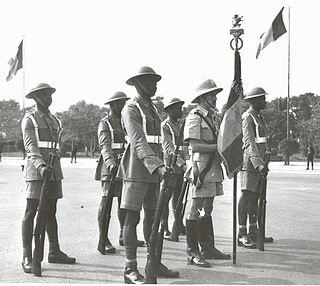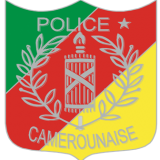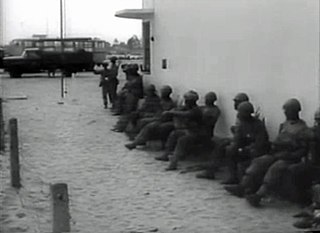The Armed Forces of the Republic of the Congo, also less formally denoted as the Forces armées congolaises or its acronym FAC, are the military forces of the Republic of the Congo. They consist of the Congolese Army, the Congolese Air Force, the Congolese Marine (Navy), and the Congolese National Gendarmerie. The dissolution of French Equatorial Africa in 1958, and France's impending military withdrawal from the Congo in August 1960, provided the impetus for the formation of the FAC. The FAC and state paramilitary agencies are headed by an Armed Forces Chief of General Staff, usually appointed by the President of the Republic of the Congo. Major General Guy Blanchard Okoï has served as chief of staff since 2012.

The Force Publique was the military of the Congo Free State and the Belgian Congo from 1877 to 1960. It was established after Belgian Army officers travelled to the Free State to found an armed force in the colony on Leopold II of Belgium's orders. The Force Publique was heavily involved in atrocities in the Congo Free State, and also saw action in the Congo–Arab War, World War I and World War II. It was renamed to the Congolese National Army in July 1960 after Congo gained independence from Belgian colonial rule.

As in many other countries with a French colonial heritage, law enforcement in Benin was a responsibility primarily shared by a military police gendarmerie and a civilian "National Police." However, in January 2018, these forces were merged into a single force called the Republican Police of Benin.
Like many other countries with a French colonial heritage, law enforcement in Burkina Faso is a responsibility primarily shared by the gendarmerie and the police.

The principle law enforcement agency in Burundi is the National Police of Burundi. The police falls within the jurisdiction of the Ministry of Public Security. It is separate from the National Intelligence Service (SNR), the state intelligence agency.

The Gendarmerie Nationale and the National Police of Cameroon were founded in 1928. They are responsible for civilian law enforcement in Cameroon.

The Gendarmerie Nationale and the Police Nationale are the national police forces of Chad.
The law enforcement agencies of Madagascar include:

The Gendarmerie Nationale is the national police force of Mauritania. The gendarmerie is part of the Army and maintains posts in the urban and rural parts of the country.
Responsibility for law enforcement in Togo is primarily shared by the Police Nationale, the civilian national police, and the paramilitary Gendarmerie nationale togolaise.

Law enforcement in the Democratic Republic of the Congo has historically been focused on furthering the state's aims with no regard for human rights. The Police nationale congolaise is the police throughout the territory of the Democratic Republic of the Congo. It was composed of between 110,000–150,000 officers as of 2010.
Law enforcement in the Central African Republic is primarily vested in the country's National Police, a uniformed civilian branch oriented almost solely towards law enforcement in urban districts, and the paramilitary Central African Gendarmerie. A third department, the Police judiciaire, is the criminal investigation division of the National Police but has become increasingly independent and is widely considered a separate branch in its own right.
Djibouti, officially the Republic of Djibouti, is a country in the Horn of Africa. It is bordered by Eritrea in the north, Ethiopia in the west and south, and Somalia in the southeast. The remainder of the border is formed by the Red Sea and the Gulf of Aden. The main police force is the Djibouti national police and Djiboutian National Gendarmerie

Radio Télévision nationale congolaise (RTNC) is the national broadcaster of the Democratic Republic of the Congo. It is government controlled in a country with a poor record on press freedom. Radio-Télévision Nationale Congolaise currently broadcasts in Lingala, French, and English.

The Tunisian National Guard is the national gendarmerie force of the Republic of Tunisia and separated from the Tunisian Armed Forces.
Mass media in the Republic of the Congo are severely restricted by many factors, including widespread illiteracy and economic underdevelopment.

The Congolese National Police is the national police force of the Democratic Republic of the Congo. The national police consists of 110,000–150,000 officers and operates on the provincial level, answering to the Interior Ministry. It is known in the DRC for corruption, repression of political dissidents, and other human rights abuses. It is currently undergoing reforms. A police academy is being built.

On 5 July 1960, soldiers of the garrisons of Léopoldville and Thysville of the Force Publique, the army of the newly independent Republic of the Congo mutinied against their white officers. The revolt quickly spread throughout the Bas-Congo and engulfed the country in disorder, beginning the Congo Crisis.
4 Commando was a mercenary unit of the Armée Nationale Congolaise in the Democratic Republic of the Congo from 1960 to 1961. It was formed in Katanga as a scratch unit made up of locally recruited citizens, Belgians, doctors, pilots and other mercenary volunteers from around the world. They are trained to be commando. The unit was initially created by Frédéric Vandewalle and later commanded by Lt. Col. Mike Hoare.










